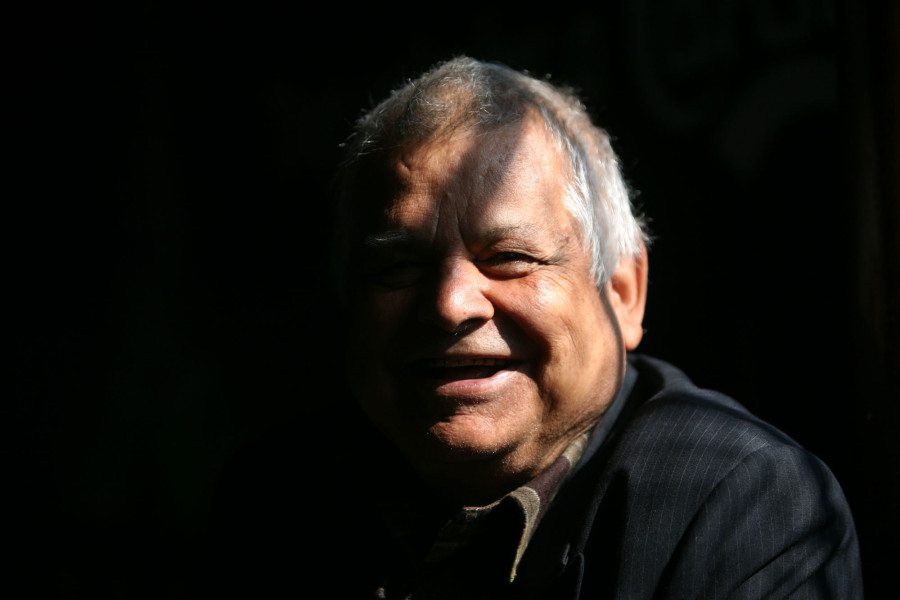Books
‘Reading and writing are as important as breathing’
Dhurba Chandra Gautam talks about his love for writing and how the Mahabharat shaped his fascination with weaving stories.
Alisha Sijapati
Dhurba Chandra Gautam was brought up in a family that thoroughly enjoyed reading and writing. As a teenager, he’d already published his first poem in the newspaper Kalyan, which was followed by publications of his stories in Rooprekha. The 75-year-old writer, who is a recipient of the Madan Puraskar and the Sajha Puraskar, says his biggest inspiration in writing is Jagadish Shumsher Rana, who was the first to appreciate his work when Gautam was a novice. Some of Gautam’s works include Alikhit, Tathakathit Asafalta, Kattel Sir ko Chot Patak and Tyo Euta Kura.
In this interview with the Post’s Alisha Sijapati, Gautam talks about his love for fiction and shares five books he thinks everyone must-read. Excerpts:
How did you first come to love books?
I have grown up with bookworms around me. My father loved reading books, the same passion was passed on to my brothers and me. During those days, there were no other means for entertainment also, so I immersed myself in fiction. My contemporaries and I have grown up reading the Mahabharata, the Ramayana and the Swasthani. These three epics are so deep in knowledge and creativity that it makes you go deeper into the world of storytelling.
As you said, many of your contemporaries grew up reading epics like the Mahabharata. Did these books create a long-lasting impact on you? How?
These three books are epics that take you on a rollercoaster ride of emotions. These are the books that compelled me to explore the world of fiction writing. They have all the elements to take you to a wonderland. More than the Ramayana and the Swasthani, the Mahabharata has played a crucial role in making me a fiction writer. I still have my old copy of the Mahabharata that consists of 18 khandas, and yes, it is not an easy read, and that makes it more beautiful. The book has 100,000 verses.
The current generation may discard the Mahabharata as a boring epic and its mythological shows that are transpired on screen, but to tell you the truth, the Mahabharata is more relevant today than ever. It talks about the future of Kalyuga and our state in this yuga. The characters give you life lessons that you’ll never forget for the rest of your life.
I am glad that I read the Mahabharata at an early age of my life, as it helped me understand the reality of the world. Even today, I sometimes read the Mahabharata shlokas (verses) to remind myself of the lessons I had learnt in my initial reading years.
What was the last book you read and did you like it?
I am currently reading Yogesh Raj’s Ranahar. I am glad that the writer has been felicitated with the Madan Puraskar this year. It is an interesting book. The plot is very gripping. I haven’t yet concluded reading it, but so far, so good.
What are the five books you read that you would recommend as must-reads?
Like I said before, everyone should have copies of the Mahabharata, the Ramayana and the Swasthani. The other book is Amar Kosh, written by Amar Simha. This book is the father of all mythological books and TV shows that are available today. I have always thoroughly enjoyed reading Margaret Mitchell’s Gone with the Wind. This book is one international novel that has all sort of emotions and historical events. The last one is Anthony Burgess’ A Clockwork Orange—it’s quite an interesting read that can always be relevant to young readers.
What books are currently on your wish-list?
I have been wanting to read C’est La Vie, the English translation of the French book, for the longest time. But unfortunately, I haven’t managed to get a hold of it. Hopefully, that wish will be fulfilled in the future.
Why do you think reading and writing is important?
I don’t know how others would convey the importance of reading and writing, but for me, these two are as important as breathing. There shouldn’t be such a question. Reading and writing is the biggest source of gaining and spreading knowledge.
What book has influenced you the most and why?
The most influential book that I have read has to be the Mahabharata. Also, Laxmi Prasad Devkota’s poems and prose have inspired me to write. I have always written stories, poems or books with out-of-the-box ideas, and Devkota is one such writer who offers that versatility in his writing. His short story Teej is something that everyone should read.
How do you draw inspiration for writing?
Some say writing is an inherent quality, but in my perspective, I feel it has a lot to do with the environment you are brought up in. I come from a household where everyone loved reading and writing. I would have been the odd one out if I didn’t have that interest, but it wasn’t a forced one. My love for reading and writing is natural. Also, once your story or article is printed—the appreciation can motivate you to work better, write more.




 9.75°C Kathmandu
9.75°C Kathmandu










